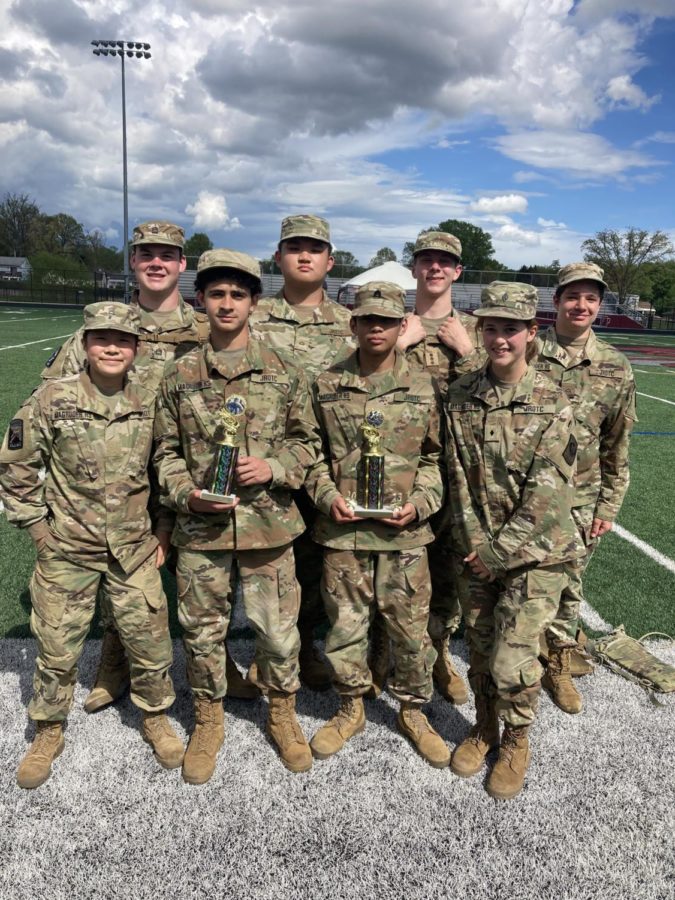Non-traditional career routes to consider after graduation
Photo courtesy of Juliana Wong
The JROTC Raiders pose with their third place trophies won during the DMV’s Joint Raider Meet.
June 6, 2023
On June 14, seniors will be walking across the stage to receive their diplomas and continue their education, career path and life in a new environment. For many, this new atmosphere will be a four-year university, but that is not the only possible road seniors are embarking on after leaving RM.
According to an article published by PBS, the National Student Clearinghouse Research Center found that there was an eight percent decrease from 2019 to 2022 in undergraduate college enrollment. This is a direct result of the pandemic, as well as other factors including financial stability and expedited sign-on bonuses. These have contributed to the decreased interest in the traditional four-year undergraduate pathway.
While many RM seniors will be stepping onto campuses as the next part of their journey, others will be venturing straight into field experience.
“I’m planning to go to the Air Force,” senior Ryan Heidarpour said. “I feel like it is good and I want constant chaos.”
Heidarpour, who is graduating early, was encouraged to join the military by his friends. “‘You might like it’, they said, and I did some research and I thought ‘yeah that is interesting’,” he said.
Heidarpour plans to attend Montgomery College in Jan. 2024 after serving in the Air Force Reserves.
“A goal that is more than three years is a dream, it’s not a goal,” Heidarpour said.
According to Advanced Engineering and Foundations of Technology teacher Mr. Shawn Ackley, student-driven research into paths that do not follow the “traditional” post-graduation path for high schoolers is crucial.
“People don’t really ask what is out there. Even if they are interested, I don’t really see it,” Mr. Ackley said.
While going into the military may not be for all, there are jobs available that do not require a college education first such as careers in construction, electrical or industrial services. Often, education in these fields is gained through apprenticeships, internships and hands-on experience.
“Unfortunately, [students] may need to move because around here, I don’t personally know of any apprenticeships that they could do,” Mr. Ackley said. “I do know that there is [a program] that is part of a Pittsburgh-based trade school. [The trade school] has a satellite in Hagerstown, where you can learn to build and repair airplanes.”
Programs like this are a way to gain skills and expand your experience to become a desirable applicant.
“Once you’re done with the 18 months [of the program], you’re incredibly hirable. If you can work on planes that are flying, you can do basically anything in construction,” Mr. Ackley said. “It’s reasonably priced, it is an 18-month-long commitment and you graduate at 19 and have a job,”
According to Mr. Ackley, one of the main benefits of entering into a trade-based field is the interactive experience that is educational as well as often paid for.
“That’s the beauty of it. You go to college and you pay for what they teach you, but you go into trades and you get paid for learning.”
Students do not have to wait until senior year or even graduation to start gaining hands-on experience. MCPS offers education specific to particular career goals and industries.
“There are ways that you can get into trade schools like through Edison,” junior Esme Pickel said.
The Thomas Edison High School of Technology is a vocational/technical high school with various programs such as carpentry, automotive technology and cosmetology.
Similarly, programs like JROTC provide a foundation for pursuing a military pathway after graduation. JROTC is the Junior Reserve Officers’ Training Corps which gives high school students a chance to explore military service.
Sophomore Juliana Wong serves as the captain of the JROTC program.
“My dad told me about it because I was interested in going into the military. When I graduate, it looks good on a resume,” she said.
Oftentimes, participating in military services can help combat financial concerns.
“I want the military to pay for my college because I want to go to a law college. If you go to the military out of college they have like a ROTC program for adults, so they pay for your college, you get benefits and it’s a really good community,” Wong said.
In determining the right route to go, whether it be the undergraduate route or apprenticeships and internships, Mr. Ackley argues that an individualistic approach is necessary.
“There is a lot more out there than people know of, including me. You can do architecture and if you’re an artist, you can go into construction as an artist,” Mr. Ackley said. “Keep an open mind, look around and think about what you love and hate. Get rid of the stuff you hate, but the stuff that you love may end up being your calling.”
Although attending a four-year university is still considered the traditional pathway for many following high school, some students argue that future success is not determined by whether or not a person attends college.
“You can be successful without college. You just need to work hard and keep working toward your goals,” Wong said.



